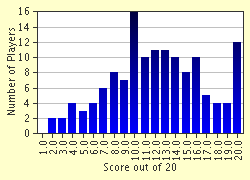Quiz Answer Key and Fun Facts
1. The New Critics were:
2. What approach to literary criticism requires the critic to know about the author's life and times?
3. Formalist critics believe that the value of a work cannot be determined by the author's intention. What term do they use when speaking of this belief?
4. What poet popularized the term objective correlative, which is often used in formalist criticism?
5. In a Freudian approach to literature, concave images are usually seen as:
6. He was an influential force in archetypal criticism.
7. Seven is an archetype associated with:
8. This feminist critic proposed that all female characters in literature are in at least one of the following stages of development: the feminine, feminist, or female stage.
9. A critic argues that in John Milton's "Samson Agonistes," the shearing of Samson's locks is symbolic of his castration at the hands of Delilah. What kind of critical approach is this critic using?
10. One archetype in literature is the scapegoat. Which of these literary characters serves that purpose?
11. One of the disadvantages of this school of criticism is that it tends to make readings too subjective.
12. This literary critic coined the term "fancy."
13. Michael Foucault was the major practitioner of this school of criticism.
14. This critical approach assumes that language does not refer to any external reality. It can assert several, contradictory interpretations of one text.
15. A critic examining John Milton's "Paradise Lost" focuses on the physical description of the Garden of Eden, on the symbols of hands, seed, and flower, and on the characters of Adam, Eve, Satan, and God. He pays special attention to the epic similes and metaphors and the point of view from which the tale is being told. He looks for meaning in the text itself, and does not refer to any biography of Milton. He is most likely a ____ critic.
16. This literary critic warned: "We must remember that the greater part of our current reading matter is written for us by people who have no real belief in a supernatural order . . . And the greater part . . . is coming to be written by people who not only have no such belief, but are even ignorant of the fact that there are still people in the world so 'backward' or so 'eccentric' as to continue to believe."
17. A critic of Thomas Otway's "Venice Preserv'd" wishes to know why the play's conspirators, despite the horrible, bloody details of their obviously brutish plan, are portrayed in a sympathetic light. She examines the author's life and times and discovers that there are obvious similarities between the conspiracy in the play and the Popish Plot. She is most likely a _________ critic.
18. This poet might be described as a moral or philosophical critic for arguing that works must have "high seriousness."
19. A critic examining Pope's "An Essay on Man" asks herself: How well does this poem accord with the real world? Is it accurate? Is it moral? She is most likely a _____ critic.
20. One of the potential disadvantages of this approach to literature is that it can reduce meaning to a certain time frame, rather than making it universal throughout the ages.
Source: Author
skylarb
This quiz was reviewed by FunTrivia editor
Bruyere before going online.
Any errors found in FunTrivia content are routinely corrected through our feedback system.


